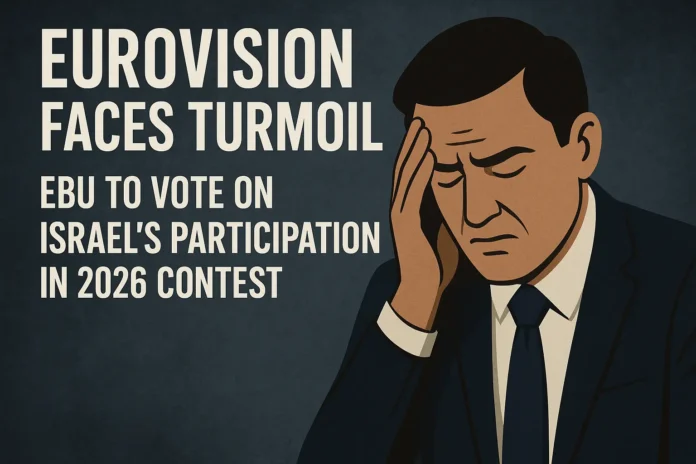The European Broadcasting Union (EBU) is preparing for an unprecedented vote that could reshape the future of the Eurovision Song Contest. Following mounting pressure from several member states, the organization announced that an extraordinary online meeting will take place in early November to decide whether Israel will be allowed to compete in the 2026 contest, scheduled to be held in Vienna, Austria.
Why the Controversy?
The debate surrounding Israel’s participation in Eurovision has been growing louder in recent months. Spain, Ireland, Slovenia, and the Netherlands have already declared that they will withdraw from Eurovision 2026 if Israel is not excluded. Meanwhile, Iceland stated that it will reconsider its participation, and Belgium announced it will finalize its decision in December.
This strong backlash is rooted in political tensions and calls for cultural boycotts, with critics arguing that Israel’s continued involvement in Eurovision undermines the contest’s spirit of unity and inclusivity.
The EBU’s Response
In an official statement, the EBU confirmed:
“We can confirm that a letter has been sent from the EBU’s Executive Board to the Director Generals of all members, informing them that the vote on Israel’s participation in the 2026 Eurovision Song Contest will take place at an extraordinary meeting of the EBU General Assembly, scheduled online in early November.”
This is a rare move for the EBU, which traditionally avoids politicizing the contest. However, the growing number of member broadcasters questioning Israel’s role has left the organization with little choice.
What’s at Stake?
The Eurovision Song Contest is not just a music competition—it is one of the most watched non-sporting events in the world, attracting an audience of over 160 million viewers annually. If several countries follow through on their threats to boycott, the contest could lose a significant portion of its diversity and appeal.
Furthermore, the EBU risks being seen as either bowing to political pressure or ignoring widespread member concerns, both of which could damage its reputation.
Reactions Across Europe
- Spain and Ireland: Both countries strongly oppose Israel’s inclusion, with government officials and broadcasters openly supporting a boycott if necessary.
- Slovenia: Public broadcasters warned they cannot justify participation under current conditions.
- The Netherlands: Dutch officials stressed that cultural events should not ignore international concerns.
- Iceland: Announced it will “seriously reconsider participation” depending on the EBU’s final decision.
- Belgium: Remains undecided but stated that its final stance will be announced in December.
Could Eurovision 2026 Be Divided?
With the contest set to be hosted in Vienna, Austria is under pressure to ensure the event does not become overshadowed by political disputes. Observers warn that a fractured Eurovision—with some countries boycotting and others participating—could harm the contest’s global image.
At the same time, Eurovision has a long history of political controversies, from debates over host nations to arguments about voting blocs. Yet, this is one of the few times when Israel’s membership itself has become the center of such intense scrutiny.
Looking Ahead
As November approaches, all eyes will be on the EBU General Assembly. The decision on Israel’s participation could mark a turning point in Eurovision history, shaping not just the 2026 contest but the future of the event itself.
Regardless of the outcome, it is clear that Eurovision is no longer just about music—it has become a reflection of Europe’s political, cultural, and social divisions.

